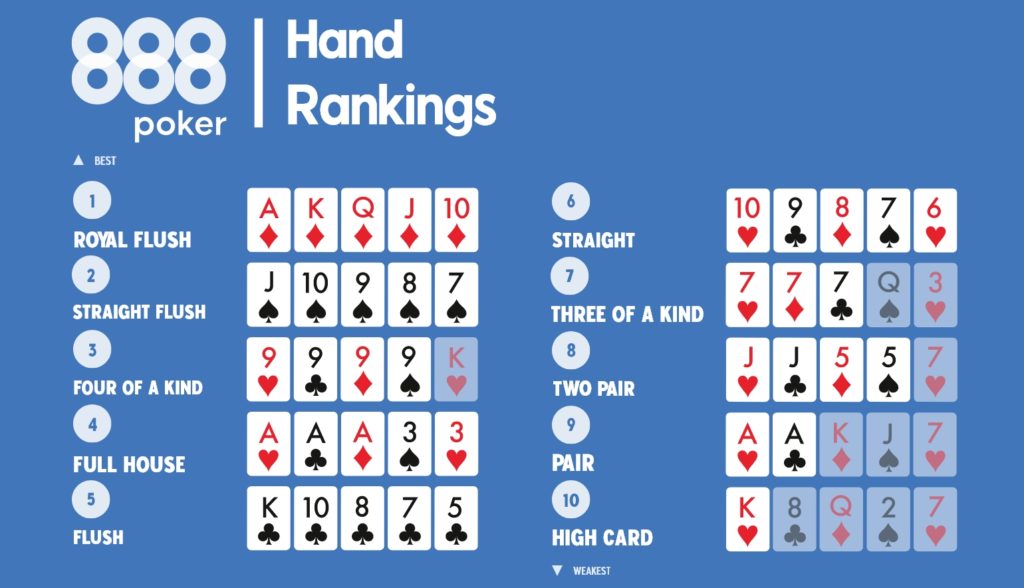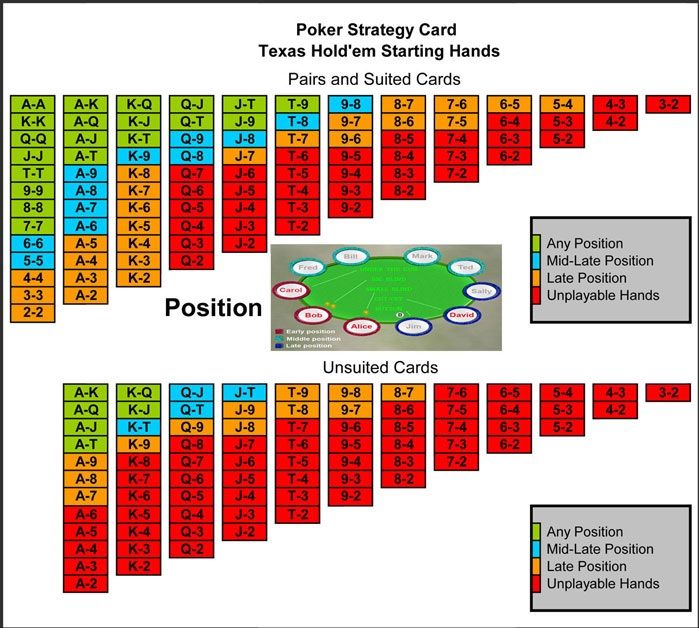Welcome to the ultimate guide on poker, a fascinating and thrilling card game that has captured the hearts of millions worldwide. Whether you’re a complete beginner or an experienced player looking to refine your skills, this comprehensive article will equip you with the knowledge and strategies needed to excel at poker. From understanding the basic rules to mastering advanced techniques, we’ll delve into every aspect of this popular casino game. So, let’s shuffle the deck, deal the cards, and dive into the captivating world of poker!

What is Poker?
Poker is a strategic casino card game that involves skill, strategy, and a touch of luck. It is typically played with a standard deck of 52 cards and can be enjoyed by a minimum of two players and a maximum of ten players. The objective of the game is to win the pot, which contains bets made by players during each hand. Players aim to form the best possible hand or convince others that they have the best hand, leading them to fold and forfeit their bets.
How to Play Poker?
To begin a game of poker, each player is dealt a certain number of cards, depending on the variant being played. The two most popular variants are Texas Hold’em and Omaha Hold’em, both of which we will explore in detail later. The game unfolds through a series of betting rounds, where players have the option to call, raise, or fold. The final stage is the showdown, where the remaining players reveal their cards, and the player with the best hand wins the pot.
Texas Hold’em: The King of Poker Games
Texas Hold’em is the most widely played and televised form of poker, attracting players of all levels of expertise. In this variant, each player is dealt two private cards (hole cards), and five community cards are placed face-up on the table. Players must create the best hand possible using any combination of their hole cards and community cards. The casino game is known for its strategic depth, psychological element, and thrilling moments, making it a favorite among professionals and casual players alike.
Omaha Hold’em: A Close Cousin of Texas Hold’em
Omaha Hold’em is another popular poker variant that shares similarities with Texas Hold’em. However, there is one significant difference – each player is dealt four private cards instead of two. From these four cards, players must use two and only two of their hole cards, along with three community cards, to create the best hand. The additional hole cards and possible combinations make Omaha Hold’em a game of greater complexity and larger pots.
Poker Hand Rankings

Understanding hand rankings is crucial in poker, as it determines the strength of your hand relative to other players. Knowing the hierarchy of hands allows you to make informed decisions during each betting round. Here are the standard hand rankings from highest to lowest:
- Royal Flush: A, K, Q, J, 10 of the same suit.
- Straight Flush: Five consecutive cards of the same suit.
- Four of a Kind: Four cards of the same rank.
- Full House: Three cards of the same rank combined with a pair.
- Flush: Five cards of the same suit, not in consecutive order.
- Straight: Five consecutive cards of any suit.
- Three of a Kind: Three cards of the same rank.
- Two Pair: Two sets of cards with the same rank.
- One Pair: Two cards of the same rank.
- High Card: The highest-ranked card in your hand when no other combinations are formed.
Essential Strategies for Success
To excel at poker, it’s essential to develop a strategic mindset and employ various techniques that maximize your chances of winning. Here, we’ll explore some fundamental strategies that every poker player should keep in mind:
Play Tight-Aggressive
Playing tight-aggressive poker involves being selective with the hands you play and adopting an aggressive betting approach when you have strong hands. By playing fewer hands but playing them aggressively, you can capitalize on the times when you do have strong holdings. This strategy allows you to control the pot, put pressure on your opponents, and increase your chances of winning.
Position Matters
The position plays a crucial role in poker. The later you act in a hand, the more information you have about your opponents’ actions, enabling you to make more informed decisions. Playing hands from late positions gives you a strategic advantage, as you can observe how your opponents behave before deciding on your own course of action.
Practice Bluffing
Bluffing is a skill that separates good poker players from great ones. By representing a stronger hand than you actually have, you can force your opponents to fold and win pots you might not otherwise deserve. However, bluffing should be used judiciously and in specific situations. Understanding your opponents’ tendencies and observing the flow of the game will help you identify the right moments to execute a successful bluff.
Pay Attention to Table Dynamics
Every poker table has its own dynamics, which can significantly influence your strategy. Factors such as the playing style of your opponents, their stack sizes, and their reactions to previous hands should all be taken into account. Adapting your play to suit the table dynamics is essential for long-term success in poker.
Manage Your Bankroll
Bankroll management is often overlooked but is crucial for any serious poker player. It involves setting aside a dedicated amount of money for poker and strictly adhering to proper bet sizing to ensure you can withstand the inevitable swings of the game. A disciplined approach to bankroll management will protect you from excessive losses and allow you to play with confidence.
Poker Tournament Strategies

Tournaments are a thrilling aspect of poker, offering the chance to compete against a large field of players and potentially win significant prizes. However, they require a different set of strategies compared to cash games. Let’s explore some tournament-specific strategies that can give you an edge:
Understand the Prize Structure
Tournament prize structures vary, and it’s important to understand the payout distribution before entering a tournament. Some tournaments offer top-heavy prize pools, where the majority of the money is awarded to the final table finishers. In contrast, others have a flatter structure, spreading the prizes more evenly. Knowing the structure will help you tailor your strategy accordingly.
Play More Aggressively
In tournaments, blinds and antes increase at regular intervals, putting pressure on players to accumulate chips. To stay ahead, you need to play more aggressively and seize opportunities to build your stack. This doesn’t mean going all-in recklessly but rather being more assertive with your bets and taking calculated risks to accumulate chips.
Be Mindful of Stack Sizes
Stack sizes play a crucial role in tournament play. As the blinds increase, the value of each chip diminishes, making it important to keep an eye on your stack size relative to the blinds. A dwindling stack may require more risk-taking, while a comfortable stack allows for a more patient and selective approach.
Adjust to Changing Dynamics
As the tournament progresses, the dynamics at the table change. Players get eliminated, and tables merge, altering the composition of opponents and the flow of the game. Being aware of these changing dynamics and adapting your strategy accordingly is key to success in tournaments.
Final Table Strategy
Reaching the final table of a poker tournament is an achievement in itself. At this stage, you’ll be playing against the most skilled opponents, and the stakes will be higher. A balanced and flexible strategy that combines aggression with caution is crucial. Observe your opponents, exploit their weaknesses, and make well-timed moves to maximize your chances of finishing in the top spots.
Common Poker Mistakes to Avoid
Even experienced players can fall victim to certain mistakes that can be detrimental to their success. By being aware of these common pitfalls, you can avoid making them and improve your overall game:
Playing Too Many Hands
One of the most prevalent mistakes among beginners is playing too many hands. It’s essential to be selective and patient, waiting for premium hands or favorable situations before getting involved in pots. Playing too many weak hands can lead to unnecessary losses and chip depletion.
Ignoring Bankroll Management
Bankroll mismanagement can be disastrous for poker players. Neglecting proper bankroll management and playing at stakes beyond your means can lead to financial ruin. It’s crucial to set aside a dedicated bankroll for poker and play within its limits to ensure longevity in the game.
Neglecting Position
The position is a fundamental concept in poker, and failing to consider its importance can be costly. Acting out of position puts you at a significant disadvantage, as you have less information about your opponents’ actions. Always be mindful of your position and adjust your strategy accordingly.
Overvaluing Weak Hands
New players often fall into the trap of overvaluing weak hands. Understanding the relative strength of your hand and its chances of improving is crucial for making informed decisions. Don’t fall in love with marginal hands and be prepared to fold when the odds are against you.
Tilt and Emotional Decision-Making
Tilt refers to a state of emotional frustration or anger that can cloud your judgment and lead to poor decision-making. It’s crucial to recognize when you’re tilting and take steps to regain composure. Emotional stability and a clear mind are essential for making rational decisions at the poker table.
Lack of Game Selection
Choosing the right game is crucial for success in poker. Playing against skilled opponents or at stakes beyond your skill level can be detrimental to your bankroll. Be mindful of game selection and seek out tables where you have a competitive advantage.
FAQs
Conclusion
Poker is a captivating game that offers endless excitement, strategic depth, and the potential for substantial rewards. By understanding the rules, mastering essential strategies, and avoiding common mistakes, you can embark on a journey to become a formidable poker player. Remember, success in poker requires a combination of skill, discipline, and adaptability.
